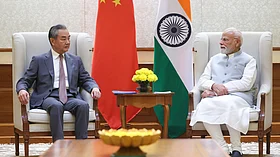China's Foreign Minister Wang Yi's South Asia Tour Puts India and Pakistan at Ease
National NationalPosted by AI on 2025-08-19 16:48:23 | Last Updated by AI on 2025-08-19 19:35:44
Share: Facebook | Twitter | Whatsapp | Linkedin Visits: 0

China's recent diplomatic efforts in South Asia could help ease India's growing tensions with Pakistan and China, sparking hope for improved relationships among the three nations.
China's state councillor and foreign minister, Wang Yi, concluded his two-day visit to Pakistan on Sunday, March 13, just a day after the 75th anniversary of IndiaChina diplomatic relations, which falls on March 12. Wang's visit is significant because it reflects Beijing's attempts to strengthen its relations with Islamabad, which many in New Delhi consider an evolving threat. Nevertheless, Wang's visit also coincides with several crucial developments that could help ease the growing tensions between India and both Pakistan and China.
Wang's trip to Pakistan occurred as India's foreign minister, S. Jaishankar, was in Sri Lanka on a two-day visit. Jaishankar's visit followed a week after Sri Lankan Prime Minister Mahinda Rajapaksa's visit to New Delhi. These reciprocal visits suggest that India and Sri Lanka are looking to strengthen their maritime relations and security cooperation in the Indian Ocean region. It also implies that India is attempting to hedge its strategic bets, considering China's growing influence in Sri Lanka and the broader Indian Ocean region.
The moves come as India, Pakistan, and China are trying to settle their overlapping territorial claims in the Himalayas. These include disputes over the Kashmir region between India and Pakistan, as well as the border area between India and Chinese-controlled Tibet, which have ignited violent conflicts and military standoffs in the past.
During Wang's visit to Pakistan, the two nations signed a five-year plan of cooperation (2021-2025) in which China vowed to provide Pakistan with US$8 billion in loans to boost the country's ailing economy. In exchange, Pakistan endorsed China's multi-billion-dollar Belt and Road Initiative (BRI). Though this agreement could help Pakistan tackle some of its economic issues, India might view it as an attempt by China to further strengthen its position in South Asia through its economic influence.
During his visit to Delhi on March 11, Wang stressed the need for both countries to mark the anniversary as a "turning point" in bilateral relations, focusing on collaboration and partnership rather than viewing each other as threats. Wang's statement underscores Beijing's willingness to improve India-China relations, which are currently strained due to political and border tensions.
While Wang's visits to Pakistan and India could contribute to easing tensions between India and Pakistan, they have not yet led to any significant bilateral concessions. Nevertheless, there is a possibility that China's recent diplomatic efforts could help alleviate the tensions between India and Pakistan and transform how these nations interact with each other, ultimately benefiting the entire South Asia region.
Ultimately, only time will tell whether China's recent diplomatic outreach in South Asia will succeed in easing tensions and leading to lasting peace and cooperation in the region. Nevertheless, Wang's recent tour has certainly added a new and intriguing chapter to the dance of great power politics in South Asia.
Search
Categories
- Sports
- Business
- History
- Politics
- International
- Science & Technology
- Social Issues
- Disaster Management
- Current Affairs
- Education
- Startup Business
- Startup News
- Awards
- Community Services
- Fundraising Events
- Volunteer Services
- Health Initiatives
- Innovations and Initiatives
- In News
- dummybanners
- Awards
- Partners
- Products
- Press Releases
- News
- Fast Check
- South
- సినిమా
- Gallery
- Sunday Chronicle
- Hyderabad Chronicle
- లైఫ్ స్టైల్
- National
- క్రైం
- ట్రెండింగ్
- జాబ్స్
- అంతర్జాతీయo
- బిజినెస్
- రాజకీయం
- బిజినెస్
- సంపాదకీయం
- నవ్య
- చిత్ర జ్యోతి
- క్రీడలు
- జాతీయం
- తెలంగాణ
- తాజా వార్తలు
- మన పార్టీ
- మన నాయకత్వం
- మన విజయాలు
- డౌన్లోడ్స్
- మీడియా వనరులు
- కార్యకర్తలు
- North East Skill Center News
- Government Schemes
- Entrepreneurship Support
- Employment Opportunities
- Skill Training Programs
- Departments
- Investments
- Initiatives
- Resources
- Telangana IT Parks
- Events & Jobs
- Press Releases
- News
- Airport News
- Newtons Laws of Motion
- Karbonn in Business
- Investments in Karbonn
- Company quarterly sales
- Markets
- Auto News
- Industry
- Money
- Advertisements
- Stock target
- Company Updates
- Stock Market
- Company Sales
- Staffing and HR
- Constituency Assembly
- General News
- Srikalahasti Temple
- Bojjala Sudhir Reddy
- Technology & Innovation
- Sports
- Business
- Products
- Industries
- Services & Trainings
- Tools & Resources
- Technology Integration
- Drug Seizures & Arrests
- Telangana Narcotics
- Law & Enforcement
- Rehabilitation
- Nationwide Drug Policing
- Nigeria Seizures
- Global Operations
- Drug Awareness
- Drug Enforcement Tech
- NCB Drug Seizures
- Judicial Crackdown
- India's Surveillance Tools
- Cross-Border Links
- Women Safety
- Cyber Crimes
- Drug Abuse
- Traffic & Road Safety
- Community Connect
- Public Safety Alerts
- Citizen Assistance
- Nellore City News
- Politics & Administration
- Events & Festivals
- Agriculture & Rural
- Business & Economy
- Health & Wellness
Recent News
- Polls Ethicality Questioned as IAS Officers Come to CEC's Defense
- 'Tainted' Leaders May Be Removed from Positions via New Bills
- Why The Need To Hold Ministers Accountable Until Proven Innocent
- Jammu and Kashmir to win all three formats, predicts Yagnik
- Ahmedabad, Gujarat's Sporting Showcase 2025
- Malaysian State's Enforcment of Sharia Law Causes Concern Among Citizens
- Unstoppable Jammu & Kashmir Armed with Team Spirit and Leadership
- Irfan Pathan Backs Shreyas Iyer After Asia Cup Snub: 'There Is No Doubt In My Mind...'